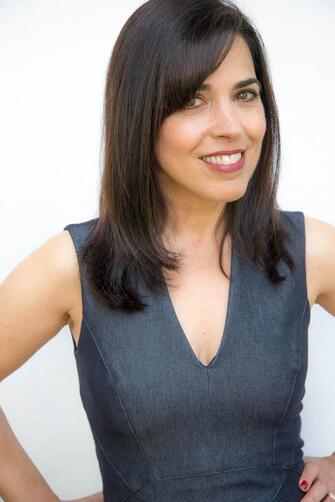
PILAR ALESSANDRA is the director of the instructional writing program On The Page,® host of the On the Page Podcast and a highly sought-after speaker and script consultant who’s trained writers at Disney, DreamWorks, ABC, the AFM and around the world. She is also the author of THE COFFEE BREAK SCREENWRITER and THE COFFEE BREAK SCREENWRITER BREAKS THE RULES. Pilar’s greatest accomplishment is the success of her students, many of whom have won top competitions such as the Nicholl Fellowship, work on TV shows such as HOLEMAND, THE 100, DEAR WHITE PEOPLE, GREY'S ANATOMY, SILICON VALLEY and THE CHI and have sold feature films and pitches to Netflix, Sony, Warner Bros. and other major studios. For more information about Pilar, her classes, consultations, book and podcast, go to www.onthepage.tv. We spoke recently about Structure Jail, how bells and whistles disguise a story, and breaking conventions.
Pilar will teach the upcoming Rewrite Techniques Interactive-Online Class, May 23 - June 13.
Dave Watson: Congratulations on a new and wonderful, if little, sequel of a great book. What's new?
Pilar Alessandra: Well, since you first asked me to participate in this interview, the world has changed. Like everyone else, I’ve temporarily closed my Studio City classroom doors due to Covid-19 restrictions. But, I’ve been able to continue teaching my classes through live video-conference on Zoom. It’s been a rewarding experience as it allows me to work with people outside of LA and all over the world. The next one is a four-part Rewrite Techniques class at the end of May.
DW: You talk about Structure Jail, like the term! Is this about formulas or following a well-worn structural path?
PA: Formulas. Every script has a beginning, middle and end, and you’ll see me offer some tried and true structural patterns noted in The Coffee Break Screenwriter. But, that doesn’t mean that a script has to have the same kinds of plot points at key structural points. What you choose to write should be up to you. And non-linear writing - as long as you’ve figured out your linear intentions first - is interesting and welcome.
DW: What writers or filmmakers are breaking rules today?
PA: Pick a movie you loved or a TV show you binged on and you’ll find a rule breaker driving it. Whether it’s Phoebe Waller-Bridge’s main character talking to the camera in Fleabag or Taika Waititi taking huge tonal risks with Jojo Rabbit, Donald Glover’s moments of surrealism in Atlanta or Greta Gerwig’s awesome non-linear approach to Little Women.
DW: What do you look for in writers? Are there some working to break conventions today? Bong Joon-Ho and Parasite come to mind.
PA: Parasite was great, wasn’t it? I don’t know if he broke conventions so much as told an excellent story that just happened to be in a different language. It had a great premise involving the family’s goals, then a surprising mid-point twist and a shocking ending. Not a lot of rule-breaking tricks until the very end - and I think we can debate whether those last ten minutes were really needed. But, the Academy certainly broke their rules by awarding it Best Everything. Thank goodness!
So to answer your questions about what I look for in writers: it’s always good storytelling first. No manner of rule-breaking or fancy bells and whistles will disguise a story that isn’t truly surprising or involving.
DW: Have you noted more writers becoming interested in screenplays because of the Shelter-in-Place order?
PA: Yes, but not because everyone’s had more time on their hands. Some people are even busier than before because they’re working from home and taking care of kids. I believe more people are expressing interest in writing scripts because the passions for their stories have grown. They have a need to really say something, right now about what they’re experiencing in the world.
DW: You write and consult worldwide. Are there rules being broken outside the U.S. that could help mainstream American film and TV?
PA: I’ve actually been struck by the similarities in themes and approach to story. No matter where I go, writers are interested in issues of personal freedom and the future of the world…as well as just trying to delight, scare, thrill or move an audience.
DW: What's next?
PA: More online classes!
DW: What's your favorite cinematic moment?
PA: I love the movie Paper Moon and there are so many great scenes in it to pick from. I chose this one because of the way the characters are both pressing their agendas and because it’s just plain entertaining.
Check out the scene involving the twenty-dollar bill and also Madeline Khan’s terrific monologue at the midpoint. Better yet, watch the whole thing.
Clip: Paper Moon
Dave Watson, founder and editor of Movies Matter, is a writer and educator in Madison, WI.

